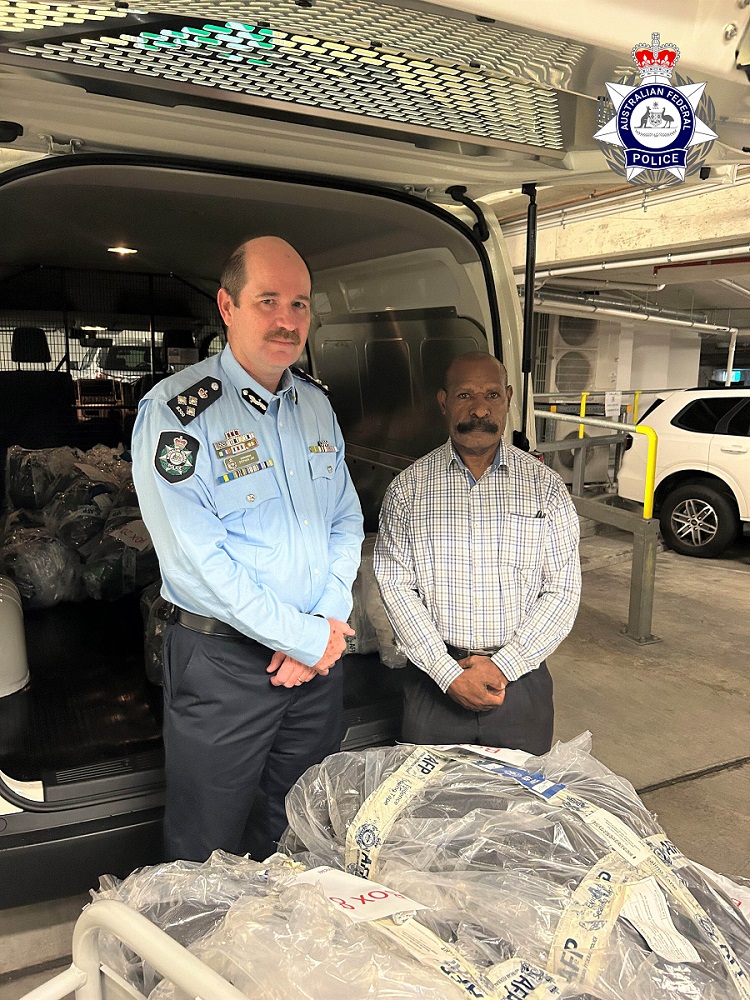Senior police officers from Papua New Guinea and Australia have monitored the destruction of 500kg of cocaine, which was seized by authorities in 2020 after the black flight believed to have been transporting it to Australia crashed.
The drugs, which were seized in PNG but later sent to the AFP for forensic testing and storage in Australia, were incinerated last week (28 November, 2024) at a secure facility in Queensland.
Operation Weathers was an investigation by the AFP, the Royal Papua New Guinea Constabulary (RPNGC), Queensland and Victoria Police, Australian Border Force (ABF), and the Australian Criminal Intelligence Commission (ACIC) into a criminal syndicate that allegedly attempted to smuggle the cocaine, worth about $800 million, from PNG to Queensland in July, 2020.
Five men in Australia and four men in PNG were charged over the alleged conspiracy after the light plane crashed north of Port Moresby on 26 July, 2020. Five days later, the RPNGC found the cocaine allegedly linked to the flight.
In September 2024, the PNG National Court of Justice handed down sentences of between 18 and 19 years’ imprisonment to the men.
The court also ordered the drugs be destroyed and for a senior RPNGC officer to witness the destruction.
RPNGC Deputy Commissioner Donald Yamasombi and AFP Commander Stephen Jay oversaw the transport of the drugs from a secure AFP vault to a secure facility in Queensland, where they were incinerated.
Commander Jay said the cocaine would have been worth about $800 million in 2020.
“It is now worth nothing thanks to the cooperation and the tenacity of all the agencies involved in Operation Weathers,” Commander Jay said.
“Had it arrived in Australia, the cocaine could have been sold as about 500,000 street deals, which would have caused considerable damage in the community.
“It was pleasing to witness the destruction with Deputy Commissioner Yamasombi, who knows all too well about the damage that illicit drugs also inflict on his country.”
Deputy Commissioner Yamasombi said the seizure of the cocaine was a victory for both nations.
“The illicit drug trade hurts both our countries in very similar ways,” he said.
“As illicit drugs transit through PNG, our community suffers from the violence and criminality associated with this harmful trade.
“As the destination country, Australia experiences these problems, along with health and societal impacts caused by drug use.
“Once again our nations have worked together successfully to reach a mutually satisfying outcome.”
The AFP uses special waste disposal facilities to destroy illicit substances after they have been forensically tested and documented for evidentiary purposes.
The drugs are typically vaporised into steam in a furnace. The remaining liquid then passes through a series of filtration systems to turn it into a harmless ash-like substance before it is released.
AFP members are required to monitor every step of the destruction process and remain on site until the drugs are destroyed.

RPNGC Deputy Commissioner Donald Yamasombi and AFP Commander Stephen Jay overseeing the transportation of the drugs from a secure AFP vault to a secure facility in Queensland, where they were incinerated.
For further information, including access to related materials, please contact the Australian High Commission media team: +675 7090 0100
